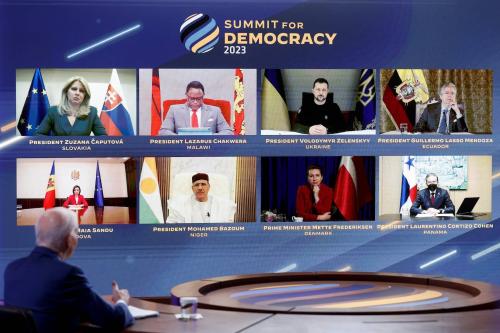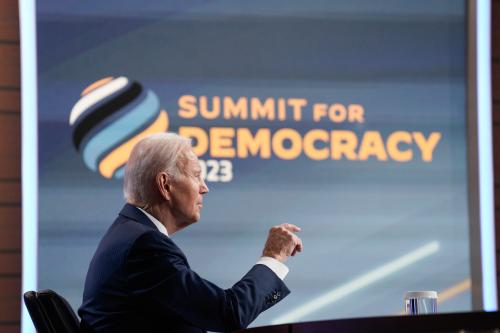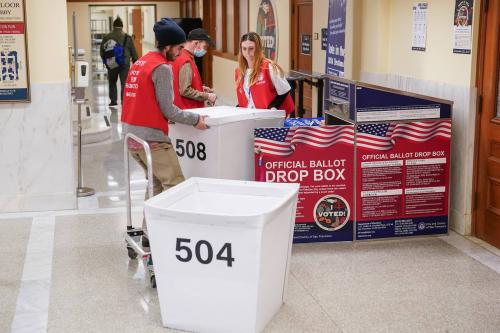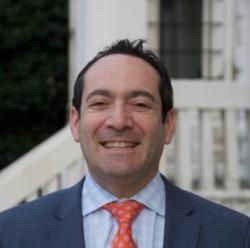The third Summit for Democracy (S4D3) in Seoul, Republic of Korea convened this week with a backdrop of serious and arguably worsening challenges to democracies globally. It’s imperative that this multilateral forum taking place in Seoul delivers on its ambitions to strengthen democratic institutions, reverse consequential backsliding globally, and tackle thorny problems, including corruption.
When President Biden promised a global Summit for Democracy (S4D) as part of his 2020 presidential campaign, the message could not have been more urgent. Numerous experts pointed to a multi-year decline in democracy and the resurgence of authoritarian tendencies, most notably in many of the world’s largest democracies. Tyranny was winning, as pointed out by Freedom House in its 2021 annual “Freedom in the World” report.
The goals of the summit were to advance democracy renewal and resilience through multiple avenues and key areas of focus.
- Inviting the participation of heads of state, formal delegations, and civil society and other democracy stakeholders.
- Asking each invited country to announce concrete commitments along three priority themes: strengthening democracy and defending against authoritarianism, addressing and fighting corruption, and promoting respect for human rights.
- Developing “democracy cohorts,” created to ensure spaces for governments, civil society, free media, private sector, and other stakeholders to collaborate, share learning and expertise, advance topics of note along the three themes, and support commitments. We have seen the impact of the work of the S4D cohorts up close through the anti-corruption Financial Transparency and Integrity (FTI) cohort that the Brookings Institution and Open Government Partnership (OGP) help co-lead.
To inform policymakers and stakeholders at S4D3 and beyond, in this essay we take a closer look at specific S4D anti-corruption commitments made since the first summit in December 2021. What were they? Were they implemented? And where were some of the successes and impact?
During the week of S4D3 (and acknowledging the importance of reinforcing efforts toward global democracy renewal in 2024 and beyond), the following analysis provides some insight into areas of advancement in democracy, countering authoritarianism, and anti-corruption efforts, including whether governments are advancing S4D commitments, and what might take efforts to the next step.
An overview of S4D commitment progress
In December 2021, more than 50 governments—including 43 member countries of OGP—pledged nearly 900 commitments at the first Summit for Democracy (S4D1). Over 100 of these commitments were related to anti-corruption reforms in areas like beneficial ownership transparency, political integrity, and bolstering anti-corruption stakeholders, including civil society.
So far, while there has been undoubted progress, we still need to see more evidence of implementation of many of these commitments. While a few participating countries stepped up and submitted self-assessments of their commitment implementation by the start of the second Summit for Democracy in March 2023, many commitments lack follow-up or accountability.
One important source of learning and monitoring for these commitments is OGP’s Independent Reporting Mechanism (IRM), which assesses all commitments in OGP national action plans for ambition, completion, and results. A recent analysis from OGP found that at least 10 countries have embedded S4D commitments into their OGP action plans. Some of these commitments have been rated as ambitious by OGP’s IRM, such as the Slovak Republic’s commitment to improving the quality of beneficial ownership data (though recent developments, including the current government’s move in Bratislava to eliminate the special prosecutor’s office responsible for investigating corruption and serious crimes, are cause for concern among anti-corruption and rule of law champions). Others, like Canada’s commitment to establish a beneficial ownership register at the federal level, have already seen concrete results, including with the 2023 passing of legislation to create this register. When these OGP national action plans conclude, there will be robust assessments of implementation to share publicly.
Going forward, the S4D process would benefit from greater involvement of civil society and other stakeholders in the design, monitoring, and implementation of commitments and increased reporting of results. One concrete way to do this is to embed S4D commitments in the OGP process, which has multi-stakeholder dialogue at its core and where 60% of all OGP commitments are implemented. The majority of S4D-participating governments are also members of OGP, and therefore already have an existing structure in which to involve civil society and other actors in developing, implementing, and reporting on commitments. By embedding S4D commitments into OGP action plans, governments can reduce duplication and make use of an existing national process that is proven to deliver results. This week’s summit may provide more information on the future of the S4D.
Cases of notable progress
Several notable anti-corruption commitments, in particular beneficial ownership and public procurement integrity commitments, feature in the S4D and OGP processes (among other spaces globally), and are worth looking at more deeply.
- The United States’ commitment on its anti-corruption strategy received the highest marks for ambition from OGP’s IRM. Not only did the U.S. commitment focus on implementing the Corporate Transparency Act, which established the beneficial ownership register in the U.S. that went live at the start of 2024, it also committed to expanding customer due diligence requirements for corruption-prone non-financial services such as real estate (that effort is now in the rulemaking phase).
- The United Kingdom also committed to open public procurement in both OGP and the S4D, including adopting the Open Contracting Data Standard. Most notably, this commitment aimed to update the U.K.’s legislation on public procurement to make procurement more flexible for agencies and simplifying the bidding for small companies. Disclosing more data also allows for better evaluation of how fair, inclusive, and competitive bids are and ensures greater transparency and accountability in the procurement process.
- The Slovak Republic committed to improve the quality of company beneficial ownership data. Showing significant impact, the Slovak Republic’s beneficial ownership data has been used to identify numerous politicians’ conflicts of interest. The Slovak Republic used both its S4D and OGP commitments to commit to improving beneficial ownership data by introducing verification systems before and after data is added to the register. OGP’s IRM has evaluated this commitment as being quite ambitious. To keep the Slovak Republic’s anti-corruption progress moving forward, the current government in Bratislava must implement the Slovak Republic’s OGP and S4D anti-corruption commitments.
- Chile committed to make public bidding more transparent through both OGP and S4D commitments. Results include making Chile’s primary bidding platform, ChileCompra, more user-friendly and comprehensive, including a section on inconsistencies detected via analysis of the data. This builds on past results in publishing information related to public works, such as relevant contracts, funding, and the status of implementation. Reforms are being introduced to require beneficial ownership information to be disclosed during the procurement process.
- Liberia also made a notable S4D commitment to ensure greater transparency and accountability in election funding. With a new OGP action plan expected this year, a promising opportunity exists for Liberia to translate this S4D commitment into domestic action through the local OGP process.
Cohorts: Shining a spotlight on implementation
Another noteworthy area of work has been the S4D democracy cohorts. Following S4D1, governments, civil society, and the private sector were encouraged to self-organize thematic focus groups, dedicated to driving forward action on core S4D themes in a “Year of Action” leading to the second summit. By February 2023, 16 cohorts had been formed, each co-led by one or more governments and civil society organizations. The democracy cohorts played a visible role in Seoul at S4D3.
The cohorts helped to demonstrate the model of successful partnership between governments, non-governmental organizations, and other stakeholders. The flexible structures of the cohorts allowed for different models of action: For example, some published joint statements or calls to action, and some created model commitments for adoption by governments. Other cohorts met in the margins of relevant international fora, where they could take advantage of the presence of experts, stakeholders, and decision-makers to advance their agendas with a wider audience and support democracy progress.
With the Brookings Institution’s and OGP’s non-governmental co-leadership, the FTI Cohort quickly settled on three core areas for furthering action in countering corruption: beneficial ownership transparency, procurement and contracting transparency, and accountability of enabling industries. Meetings of the cohort were held in the margins of relevant international conferences including the International Anti-Corruption Conference (IACC), the OGP Global Summit, and the Conference of the States Parties to the UN Convention Against Corruption. In addition, the cohort convened virtually for a series of spotlight meetings on each core area and produced summaries of these discussions with resources and recommended further action. In March 2023, the cohort produced a Pledge and Call to Action for governments and non-governmental organizations to adopt to further their efforts in promoting financial transparency and integrity globally.
Lessons from the FTI Cohort show that success is attributable to a few factors: First, we had a strong inclusive group of participants—a mix of governments, international organizations, private sector, civil society, and independent media expertise—working together as equals to share knowledge and address challenges. Second, we maintained a regular pace of convenings to sustain momentum, taking advantage of in-person connections of thematic experts in the margins of relevant international events. Finally, we developed a coherent and targeted set of sub-themes where there was and is a window of political opportunity to scale up progress.
The FTI Cohort was successful in building a multistakeholder community including governments clearly focused on delivering progress, drawing upon the expertise and support from non-governmental organizations and other experts. There is a continued need to bring together stakeholders, in a similar fashion to the FTI Cohort, to further and mainstream the anti-corruption agenda and its implementation and to adapt to new challenges.
In conclusion
International fora, including S4D3 and other summits and conferences, can be critical venues for stakeholders to take action to renew democracy in an era of competition and mounting illiberalism. However, they are not cure-alls for the challenges facing democracies, including in the fight against corruption. Implementing the commitments made at such events is key to fully deliver concrete and sustainable changes at the local, national, and global levels.
There are few issues more urgent than defending democracy and ending corruption if we are to tackle the world’s biggest endemic problems. In the short- and long-term, the Summit for Democracy, and other multilateral fora, can help to contribute to those changes. But to fully realize its potential, the S4D must strengthen its mechanisms of accountability; take greater advantage of existing multilateral processes like OGP that already have built-in systems that encourage increasing ambition and accountability; or do both. In these challenging times, it is well worth the effort to make sure that we commit to bolster collective action to ensure democracy continues to survive and thrive.
-
Acknowledgements and disclosures
Thanks to Kristen Rose, Renzo Falla, and Joe Foti for their valuable contributions to this piece and to Louise Russell-Prywata for her thoughtful comments. Thanks to Caroline Cornett and Eric Urby for fact-checking, and to Eric Urby and Lily Conway for copyediting.
The Brookings Institution is committed to quality, independence, and impact.
We are supported by a diverse array of funders. In line with our values and policies, each Brookings publication represents the sole views of its author(s).










Commentary
Advancing Summit for Democracy commitments: Progress and paths forward
March 19, 2024